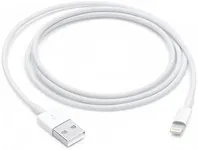Best Lightning Cables
From leading brands and best sellers available on the web.
Belkin
Belkin BoostCharge Pro Flex Braided USB Type C to Lightning Cable (2M/6.6ft), MFi Certified 20W Fast Charging PD Power Delivery for iPhone 14, iPhone 13, 12, 11, Pro, Max, Mini, SE, iPad - White

Apple
Apple USB-C to Lightning Cable (2 m)

Belkin
Belkin BoostCharge Pro Flex Braided USB Type A to Lightning Cable (2M/6.6FT), MFi Certified Charging Cable for iPhone 14, 13, 12, 11, Pro, Max, Mini, SE, iPad - Blue

Belkin
Belkin USB-C to Lightning Cable (iPhone Fast Charging Cable for iPhone 8 or later) Boost Charge MFi-Certified iPhone USB-C Cable, 3ft/1m, White, Model Number: CAA003bt1MWH

Anker
Anker New Nylon USB C to Lightning Cable, Apple MFi Certified for iPhone 14 Series, and More (10FT, Black)

Belkin
Belkin BoostCharge Pro Flex Braided USB Type A to Lightning Cable (1M/3.3FT), MFi Certified Charging Cable for iPhone 14, 13, 12, 11, Pro, Max, Mini, SE, iPad - Black

Anker
Anker Phone Charging Cord, Lightning to USB C Cable [6FT], MFi Certified, Bio-Based, for iPhone 14 Series and More (USB 2.0, Green)

Belkin
Belkin BoostCharge Braided Lightning Cable - 3.3ft/1M - MFi Certified Apple iPhone Charger USB to Lightning Cable - iPhone Cable - iPhone Charger Cord - Apple Phone Charger - Black

Belkin
Belkin Braided USB C to Lightning Cable MFi Certified iPhone Fast Charger Type C Compatible with iPhone 13, 12, 11, Pro, Pro Max, Mini, iPad, AirPods, and Other Lightning Devices 3.3FT/1M (White)




![iPhone Charger Apple Charger,[Apple MFi Certified]2 Pack Apple Type C Wall Charger Block with 2 Pack [6FT&10FT] Long USB C to Lightning Cable for iPhone 14/13/12/12 Pro Max/11/Xs Max/XR/X,AirPods Pro](https://images-proxy.bestreviews.guide/iClhKTi_0YM2XArsiwJO55H1snQ=/0x150/https://m.media-amazon.com/images/I/31qBd8apLML._AC_CX679_.jpg)
![Anker Powerline II Lightning Cable, [6ft MFi Certified] USB Charging/Sync Lightning Cord Compatible with iPhone SE 11 11 Pro 11 Pro Max Xs MAX XR X 8 7 6S 6 5, iPad and More](https://images-proxy.bestreviews.guide/6cpfsAVa1gbuSSUY3vnVR284b8s=/0x150/https://m.media-amazon.com/images/I/31549GhneGS._AC_CX679_.jpg)



